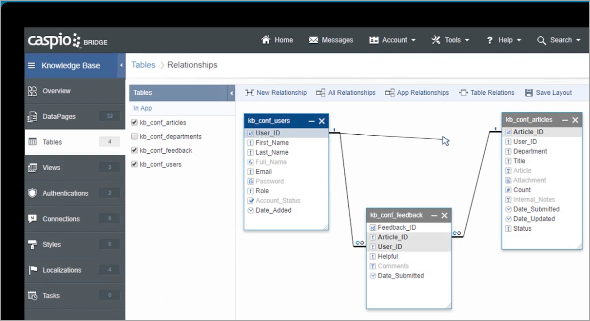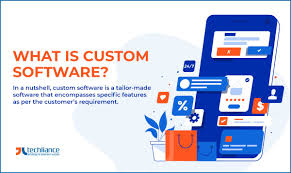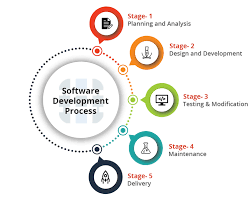Empowering Innovation: The Evolution of a Programming Company in the Digital Age
The Role of a Programming Company in Today’s Digital World
In today’s fast-paced digital world, the role of a programming company is more crucial than ever. These companies play a vital role in developing software solutions that power businesses, drive innovation, and enhance user experiences.
What Does a Programming Company Do?
A programming company specializes in creating custom software applications tailored to meet the specific needs of their clients. Whether it’s developing mobile apps, web applications, enterprise software, or complex systems integration, these companies have the expertise to turn ideas into functional and efficient software solutions.
Key Responsibilities of a Programming Company:
- Software Development: One of the primary responsibilities of a programming company is to develop high-quality software applications using various programming languages and technologies.
- Testing and Quality Assurance: Ensuring that the software meets quality standards through rigorous testing processes is essential to deliver bug-free and reliable products.
- Maintenance and Support: Providing ongoing maintenance and support services to ensure that the software continues to function optimally and remains up-to-date with changing requirements.
- Consultation and Collaboration: Collaborating with clients to understand their needs, provide expert advice on technology choices, and deliver solutions that align with business goals.
The Impact of Programming Companies:
Programming companies have a significant impact on various industries by enabling digital transformation, streamlining processes, improving efficiency, and enhancing customer experiences. They help businesses stay competitive in today’s technology-driven landscape by leveraging cutting-edge technologies and best practices in software development.
Conclusion
In conclusion, programming companies play a crucial role in shaping the digital future by developing innovative software solutions that drive business growth and empower organizations to achieve their goals. Their expertise, dedication to quality, and commitment to excellence make them invaluable partners for businesses seeking to harness the power of technology for success.
7 Advantages of Partnering with a Leading Programming Company
- Expertise in various programming languages and technologies
- Customized software solutions tailored to specific business needs
- Ability to develop innovative and cutting-edge applications
- Enhanced efficiency and productivity through automation and optimization
- Access to a team of skilled professionals with specialized knowledge
- Continuous support and maintenance for seamless software operation
- Collaborative approach to problem-solving and solution development
Key Challenges Facing Programming Companies: Costs, Delays, Talent Retention, Communication, and Security Risks
- High costs associated with custom software development
- Potential delays in project timelines due to unforeseen challenges
- Difficulty in finding and retaining top talent in a competitive industry
- Challenges in effectively communicating technical concepts to non-technical clients
- Risk of security vulnerabilities if proper cybersecurity measures are not implemented
Expertise in various programming languages and technologies
A notable advantage of a programming company is its expertise in various programming languages and technologies. This proficiency allows the company to adapt to diverse project requirements and choose the most suitable tools for each task. By staying abreast of the latest advancements in programming languages and technologies, the company can deliver innovative solutions that align with industry best practices and cater to the specific needs of their clients. This breadth of expertise enables the programming company to tackle a wide range of projects effectively and efficiently, ensuring high-quality outcomes for their clients.
Customized software solutions tailored to specific business needs
One of the key advantages of partnering with a programming company is their ability to deliver customized software solutions tailored to specific business needs. By understanding the unique requirements and challenges of each client, these companies can develop bespoke applications that address specific pain points and optimize processes. This personalized approach ensures that the software aligns perfectly with the client’s goals, enhances operational efficiency, and provides a competitive edge in the market. Ultimately, the ability to create tailored solutions sets programming companies apart in delivering impactful and effective software solutions that drive business success.
Ability to develop innovative and cutting-edge applications
One of the key advantages of a programming company is its ability to develop innovative and cutting-edge applications. By staying updated with the latest technologies and trends in the industry, these companies can create software solutions that push the boundaries of what is possible. Their expertise allows them to leverage new tools, frameworks, and techniques to develop applications that are not only functional but also set new standards for user experience and performance. This capability enables businesses to stay ahead of the competition and meet the evolving needs of their customers in today’s dynamic digital landscape.
Enhanced efficiency and productivity through automation and optimization
Programming companies offer a valuable pro by enhancing efficiency and productivity through automation and optimization. By developing custom software solutions tailored to streamline processes and eliminate manual tasks, these companies empower businesses to operate more efficiently. Automation of repetitive tasks not only saves time but also reduces the margin of error, leading to increased productivity. Through optimization of workflows and systems, programming companies help organizations maximize their resources and achieve higher levels of efficiency in their operations.
Access to a team of skilled professionals with specialized knowledge
A significant advantage of partnering with a programming company is gaining access to a team of skilled professionals with specialized knowledge. These experts bring a wealth of experience in various programming languages, technologies, and industries, allowing them to tackle complex projects with precision and efficiency. Their diverse skill sets and deep understanding of software development enable them to deliver high-quality solutions tailored to meet specific client needs, ensuring the successful execution of even the most challenging technical requirements. Collaborating with such a team not only enhances the quality of the final product but also provides valuable insights and innovative approaches that drive business growth and success.
Continuous support and maintenance for seamless software operation
Continuous support and maintenance provided by a programming company is a valuable pro that ensures seamless software operation. By offering ongoing assistance, updates, and troubleshooting services, programming companies help businesses maintain the functionality and performance of their software solutions. This proactive approach not only minimizes disruptions but also allows for timely enhancements and optimizations to keep the software running smoothly and efficiently, ultimately contributing to improved productivity and user satisfaction.
Collaborative approach to problem-solving and solution development
A key advantage of a programming company is its collaborative approach to problem-solving and solution development. By working closely with clients, understanding their unique challenges, and involving them in the decision-making process, programming companies can create tailored solutions that precisely address the client’s needs. This collaborative effort not only ensures that the final product meets expectations but also fosters a sense of ownership and partnership between the company and its clients, leading to more successful outcomes and long-lasting relationships.
High costs associated with custom software development
One significant drawback of engaging a programming company for custom software development is the high costs involved. Developing bespoke software tailored to specific requirements can be a costly endeavor, as it requires skilled professionals, extensive time investment, and specialized tools and technologies. The expenses associated with custom software development may include initial consultation fees, ongoing development costs, testing and quality assurance expenses, maintenance and support fees, as well as potential additional charges for any modifications or updates required in the future. These high costs can pose a challenge for businesses with limited budgets or those looking to minimize expenses in their software development projects.
Potential delays in project timelines due to unforeseen challenges
Potential delays in project timelines due to unforeseen challenges can be a significant con of working with a programming company. Despite careful planning and project management, unexpected issues such as technical complexities, scope changes, or resource constraints can arise during the development process, leading to project delays. These delays not only impact the scheduled delivery of the software but also disrupt other interconnected tasks and may result in increased costs. Effective communication, proactive risk management, and flexibility in adapting to unforeseen challenges are essential for programming companies to mitigate this con and ensure successful project outcomes.
Difficulty in finding and retaining top talent in a competitive industry
One significant challenge faced by programming companies is the difficulty in finding and retaining top talent in a highly competitive industry. With a constant demand for skilled programmers and developers, attracting and keeping top-tier professionals can be a daunting task. The fast-paced nature of technological advancements requires companies to continuously seek individuals with up-to-date skills and expertise, making talent retention a critical aspect of maintaining competitiveness and delivering high-quality software solutions.
Challenges in effectively communicating technical concepts to non-technical clients
One significant challenge faced by programming companies is effectively communicating technical concepts to non-technical clients. Translating complex programming jargon and intricate technical details into understandable language for clients who may not have a background in IT can be daunting. Clear and concise communication is essential to ensure that clients grasp the value and implications of the proposed solutions. Bridging this communication gap requires patience, empathy, and the ability to convey technical information in a way that resonates with the client’s goals and objectives. Overcoming this challenge is crucial for building trust, fostering collaboration, and ensuring successful project outcomes between programming companies and their non-technical clients.
Risk of security vulnerabilities if proper cybersecurity measures are not implemented
One significant con of a programming company is the risk of security vulnerabilities if proper cybersecurity measures are not implemented. In today’s digital landscape, where cyber threats are constantly evolving, overlooking robust security protocols can expose software applications to potential breaches, data leaks, and malicious attacks. Failure to prioritize cybersecurity can not only compromise sensitive information but also tarnish the reputation of both the programming company and its clients. It is imperative for programming companies to invest in comprehensive cybersecurity strategies and stay vigilant in addressing potential vulnerabilities to safeguard their software solutions and protect against cyber threats effectively.








